The Surprising Stats Behind New Year’s Resolutions

You make a New Year’s resolution with the best of intentions and promise yourself everything will be different this year…but just how likely are you to keep your resolution?
We surveyed 400 people aged 18-55+ in the US and UK to see how they’re doing sticking to their 2017 goals. How do you compare? Read on to find out whether you’re better than the rest or you’re just not trying hard enough.
What’s The Most Popular New Year’s Resolution?
It might feel like the whole world has turned into non-alcohol drinking yawn fests but in reality, only 2% of those surveyed chose to stop drinking as their New Year’s Resolution.
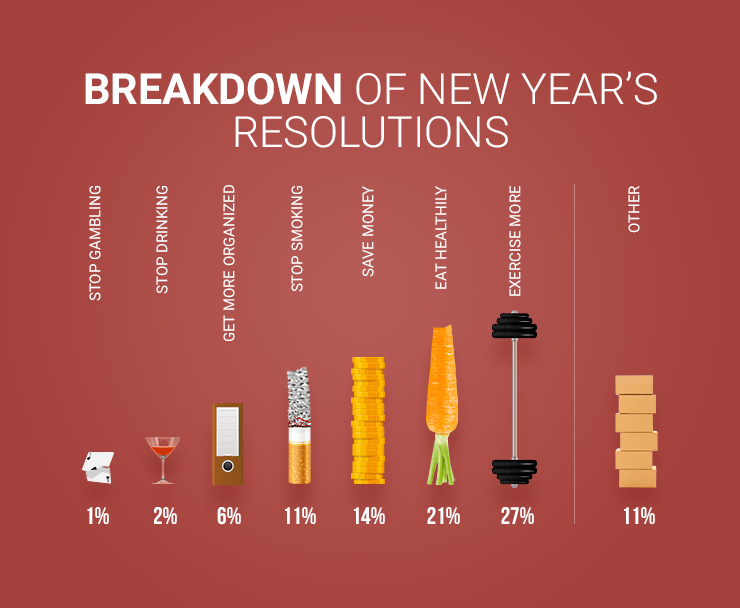
The reasons people gave for why they set a resolution in the first place are also interesting:
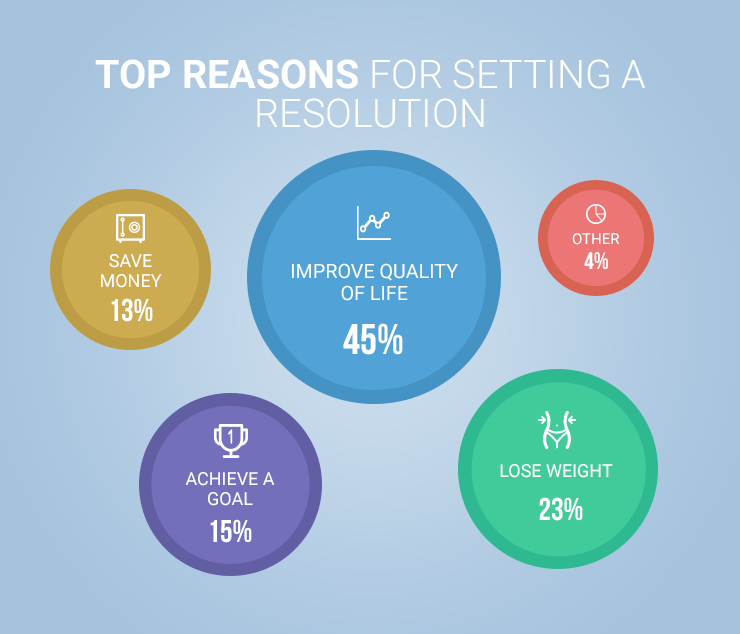
How Long Do People Actually Keep Their Resolutions For?
If you’ve haven’t given up your New Year’s resolution already, you’re in good company.
76% of all female respondents are still sticking to their New Year’s resolution and 63% of males are doing the same.
Here’s how long people have managed to last:
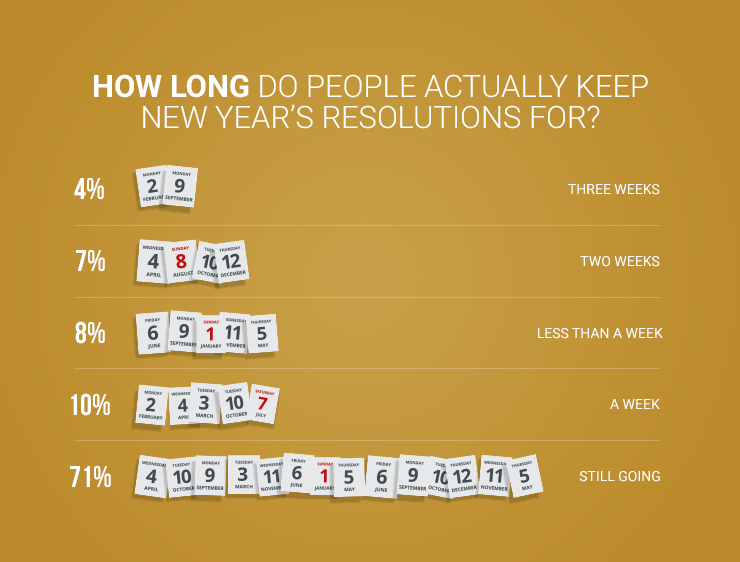
The Facts: An Overview

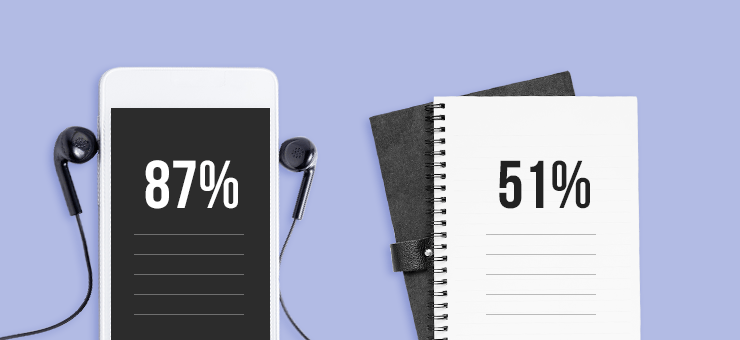
31% of all people didn’t even bother setting a New Year’s Resolution.
It’s the older folks who appear to be over the idea of attempting to improve their lives. Only 51% of over 55s made a resolution this year, compared to 87% of 18-24-year-old’s.
People in the UK also don’t seem to let their own previous failures stop them from trying again either.
93% of British respondents aged 25-34 made a resolution for 2017, despite the fact that only 55% of them managed to keep last year’s resolution.
How people keep on top of their New Year goals also varies from the USA to the UK. In America 58% of 25-34-year-olds use an app to track their progress but in the UK that figure is only 39%.
Young, Dumb And Full Of Excuses?
Americans are known around the world for their can-do attitude but apparently that doesn’t extend to the youth of today though. Only 15% of US 18-24 year-olds made a New Year’s resolution. Across the pond in the UK, 30% of 18-24 year-olds did the same thing.
Sorry USA, you can’t argue with facts…even if your President does sometimes.
In fact it’s the 25-34 year-olds leading the pack in America. 91% of 25-34 year-old’s normally make a resolution and only 36% of over 55s do.
There definitely seems to be a link between your age and how likely you are to keep your resolution too. Our survey found that 93% of people aged 45-54 are still committed to their New Year’s resolution but amongst 25-34 year-olds, that drops to just 47%.

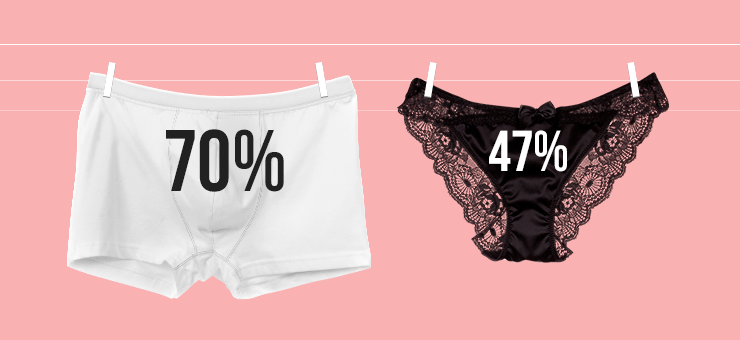
The stereotype goes that men hate commitment but our survey shows that’s completely false. Well, they don’t mind committing to themselves, at least. 70% of US males made a resolution that they kept for years, while only 47% of females did this.
Another interesting stat shows that despite the fact that dieting is generally considered to be more of a female than a man thing, the difference between the sexes when it comes to eating healthily is actually tiny.
19% of men vs 23% females said their main New Year’s resolution was to eat more healthily.
Men and women also seem to be under equal pressure to look good too. 25% of men pledged to exercise more in 2017, while 29% of women are aiming for the same goal.
US vs UK

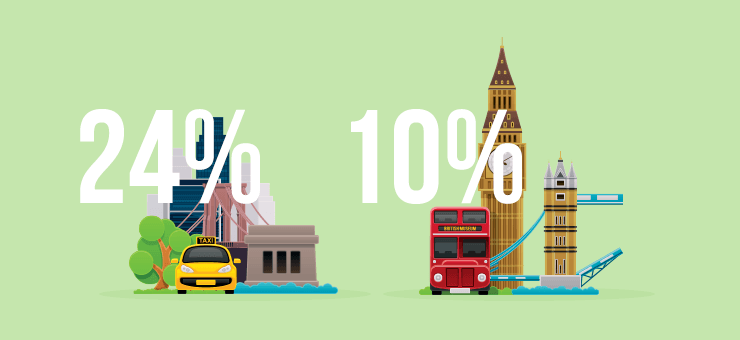
In America and in Great Britain, millennials get a tough ride from the older generation for being lazy and self-entitled. Is that just a load of lies made up by people who can feel the clutches of death tightening around their wrinkly necks? Nope.
The facts are that only 47% of US 25-34-year-olds are still going with their resolution’s. The millennial generation isn’t a complete lost cause though. They’re holding their own in the UK, where 73% of 25-34-year-olds are still going strong with their resolutions.


When it comes to keeping a close eye on their bank balance, women were twice as likely as men to pick saving money as their main resolution.
How old you are also affects whether you’re even remotely concerned with building up a nice nest egg. Only 8% of 35-44-year-old’s chose saving money for a resolution but 21% of the 45-54 age group said the same thing.


